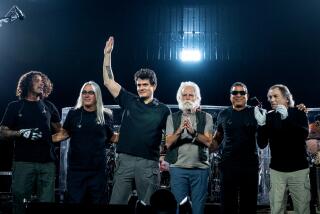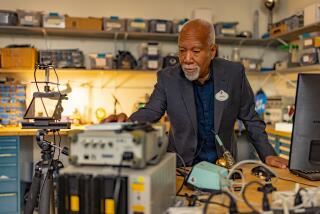Entrepreneur’s Wild Ride : His Computer Game Firm Emerges From the Maxwell Nightmare
- Share via
ALAMEDA — When computer entrepreneur Gilman Louie awoke one day last fall to the news that media baron Robert Maxwell had vanished from his yacht, he knew he’d be in for some interesting times.
But Louie, whose up-and-coming computer game company, Sphere Inc., was 89% owned by Maxwell, never imagined the surreal odyssey that would follow, involving shadowy Lichtenstein trusts, desperate Maxwell family members, determined bankruptcy investigators and destitute pensioners.
For 10 months, the 32-year-old Louie fought a daily battle to keep Sphere alive amid the rubble of the collapsed Maxwell empire, with the goal of arranging a buyout that would keep the company intact.
And now, Louie has finally gained his prize. Sphere, which is being re-christened as Spectrum Holobyte, is expected to announce today that a blue chip investment group--including the prominent Silicon Valley venture capital firm Kleiner, Perkins, Caufield & Byers, AT&T;, Silicon Graphics Chairman Jim Clark and Stanford University--has acquired a controlling interest in the company for $4 million.
The transaction clears the way for Spectrum to take full advantage of its highly regarded game technologies, which place it squarely at the intersection of the computer and entertainment industries. The company has major ambitions in “virtual reality,” an emerging technology in which people are immersed in a computer-generated world. Spectrum is working with Paramount Pictures to develop virtual reality centers based on the “Star Trek” movies at shopping malls.
Louie, a cheerful, unpretentious San Francisco native, is still incredulous when he recounts his company’s ordeal as it was caught up in the last-ditch maneuverings of the faltering Maxwell empire. “We can’t quite believe this really happened,” he says. “It was like watching a movie.”
The Sphere story begins in 1982, when Louie started the computer game company while a student at San Francisco State University. His parents took out a second mortgage on their home to finance the firm, and early employees were paid in stock instead of cash. The first big break came in 1984 when ASCII Corp., a major Japanese software company, hired Louie’s firm to write a flight simulation game that became a major hit.
That success attracted the attention of Jim Mackonochie, head of Mirror Software, a division of Maxwell’s British-based Mirror Group newspapers. A meeting between Louie and Robert Maxwell’s son, Kevin, followed in 1986, and the young Maxwell offered to buy the company. Louie agreed to sell an 80% interest for $2.3 million, and the company was merged with a Colorado software distributor called Spectrum Holobyte that Maxwell acquired at the same time.
Oddly, the merged entity, called Sphere Inc., was purchased not by one of Maxwell’s Byzantine array of public and private corporations, but by a mysterious, Maxwell-controlled charitable trust in Lichtenstein, a tiny European nation with strict rules on financial secrecy.
The arrangement with Maxwell was trouble from the start for Louie’s company. Nobody could decide to whom he was supposed to report. The company’s directors included Kevin Maxwell and a sister, Christine Maxwell, and her husband, David Hayden of Berkeley. But Louie says that when he called board meetings, no one would show up.
Kevin Maxwell, who now faces fraud charges in England, could not be reached for comment. Hayden did not return phone calls. And Christine Maxwell refused to comment.
Still, Sphere grew rapidly on the strength of its Falcon flight simulator. It scored another major hit with the rights to a Soviet computer game called Tetris.
Then, on Nov. 5, 1991, Robert Maxwell was found dead after he was reported missing from his yacht. Within weeks, his far-flung publishing empire was disintegrating amid revelations of massive fraud, including the diversion of more than $1 billion in pension fund money from various Maxwell companies. Sphere, which relied on Maxwell for cash, was suddenly in crisis.
“It got so bad that managers weren’t paying themselves so that they could meet their payroll,” Louie says.
Louie tried to persuade the trust--and the Maxwell family, which appeared to be in control--that they should sell Sphere. But Kevin Maxwell, struggling to save his reputation and part of his fortune, didn’t want to sell, Louie says.
“They (the Maxwell siblings) saw Sphere as the Phoenix, rising up out of the ashes to rebuild the Maxwell empire,” says Dan Kaufman, Louie’s lawyer.
Eventually, Kevin Maxwell agreed to sell. But there was a big problem: He didn’t have the authority to do so. Only the mysterious trust administrators could sign off on a sale.
“I had no idea who these people even were,” Louie recalls. “I had no physical person to deal with. It was all through this law firm.”
Then, in June, the British press reported on “secret Maxwell companies” controlled by the trust: Sphere and another entity called PH (US) Inc., or Phusi.
British parliamentary investigators and the press suspected that these firms might possess funds that could be used to pay off thousands of defrauded pensioners. Those suspicions were fueled when Kevin Maxwell was discovered to be using a London office leased by Sphere.
Phusi is under investigation by British authorities as a shell company suspected of being a vehicle for illegal transfer of funds among various Maxwell entities.
In the end, Sphere was able to persuade almost everybody that it is a legitimate company that played no part in Maxwell’s shenanigans. Still, the deal has taken many months because of the dizzying array of parties involved.






